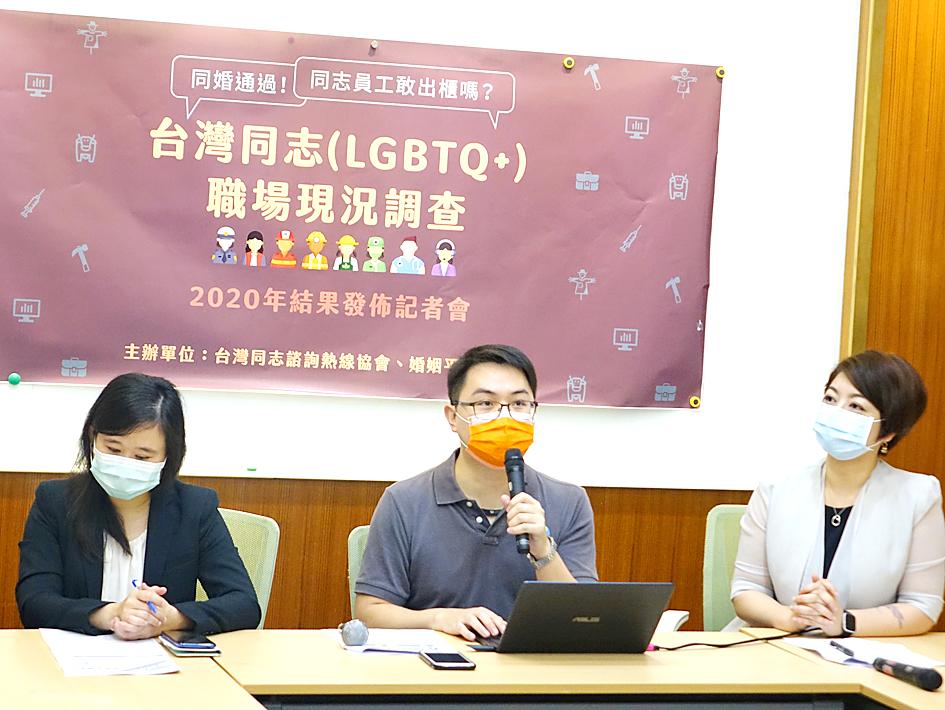Nearly half of LGBT+ people, or 49.7 percent, are concerned that their workplace relations would be affected if they came out at work, a survey released yesterday by two groups showed.
The respondents were also worried that disclosing their sexual orientation or gender identity at work could affect their chances at promotion or career development (38.2 percent), or that it could lead to bullying or harassment (35.5 percent), the survey conducted by Taiwan Tongzhi (LGBTQ) Hotline Association and Marriage Equality Coalition Taiwan showed.
Fifty-five percent of respondents said they came out to a “small number of colleagues,” while less than 30 percent said they came out to a direct supervisor or someone in a more senior position than themselves, the survey showed.

Photo: Wang Yi-sung, Taipei Times
One respondent, an engineer working for a technology firm in Hsinchu, said that he decided to come out at work because he was expecting to become a father and would have to ask for more time off.
Another respondent, a public servant from Kaohsiung, said that she came out at work so that she could “share the joy” with her colleagues if she marries one day and claim a financial aid that her employer offers to employees who marry.
According to the survey, 38.1 percent of respondents said there were employees at their workplace who were “openly out,” up from 27.3 percent in a similar survey conducted by the association in 2016.
Chiu Yu-fan (邱羽凡), an assistant professor of law at National Chiao Tung University, said that despite the increase, she believes there has not been much improvement in the daily lives of LGBT+ people, particularly in the workplace.
While there are legal protections against discriminatory practices in the workplace in Taiwan, their enforcement could be improved, she said.
According to the poll, 53.1 percent of respondents said their employers “do not have any gender-friendly measures or have never expressed LGBT-friendly views.”
About 70 percent of respondents said they hoped their employers would host “LGBT and gender-friendly courses, talks or educational training.”
Marriage Equality Coalition Taiwan chief coordinator Jennifer Lu (呂欣潔) called for cooperation to create work environments that are more friendly toward LGBT+ people.
Work is an important part of people’s lives, with some people spending more time with their colleagues than their family members, she said.
A majority of people who participated in the survey (84.3 percent) work full-time and more than half (58.7 percent) were aged 26 to 35.
Among the respondents, 74.5 percent identified as homosexual and 22.4 percent identified as bisexual, the groups said.
They said that 42.4 percent of respondents identified as cisgender male, 48.6 percent identified as cisgender female and 7.7 percent identified as transgender men or women.
The survey collected 2,121 valid responses online from Jan. 20 to March 2 and has a margin of error of 2.1 percentage points.

POSITIVE DEVELOPMENT: Japan and the US are expected to hold in-depth discussions on Taiwan-related issues during the meeting next month, Japanese sources said The holding of a Japan-US leaders’ meeting ahead of US President Donald Trump’s visit to China is positive news for Taiwan, former Japan-Taiwan Exchange Association representative Hiroyasu Izumi said yesterday. After the Liberal Democratic Party’s landslide victory in Japan’s House of Representatives election, Japanese Prime Minister Sanae Takaichi is scheduled to visit the US next month, where she is to meet with Trump ahead of the US president’s planned visit to China from March 31 to April 2 for a meeting with Chinese President Xi Jinping (習近平). Japan and the US are expected to hold in-depth discussions on Taiwan-related issues during the

‘LIKE-MINDED PARTNER’: Tako van Popta said it would be inappropriate to delay signing the deal with Taiwan because of China, adding he would promote the issue Canadian senators have stressed Taiwan’s importance for international trade and expressed enthusiasm for ensuring the Taiwan-Canada trade cooperation framework agreement is implemented this year. Representative to Canada Harry Tseng (曾厚仁) in an interview with the Central News Agency (CNA) said he was increasingly uneasy about Ottawa’s delays in signing the agreement, especially as Ottawa has warmed toward Beijing. There are “no negotiations left. Not only [is it] initialed, we have three versions of the text ready: English, French and Mandarin,” Tseng said. “That tells you how close we are to the final signature.” Tseng said that he hoped Canadian Prime Minister Mark Carney

President William Lai (賴清德) yesterday bestowed one of Taiwan’s highest honors on Saint Vincent and the Grenadines (SVG) Ambassador Andrea Clare Bowman in recognition of her contributions to bilateral ties. “By conferring the Order of Brilliant Star with Grand Cordon on Ambassador Bowman today, I want to sincerely thank her, on behalf of the Taiwanese people, for her outstanding contribution to deepening diplomatic ties between Taiwan and SVG,” Lai said at a ceremony held at the Presidential Office in Taipei. He noted that Bowman became SVG’s first ambassador to Taiwan in 2019 and

A man walks past elementary school artworks at the Taipei Lantern Festival in Ximen District yesterday, the first day of the event. The festival is to run from 5pm to 10pm through March 15.